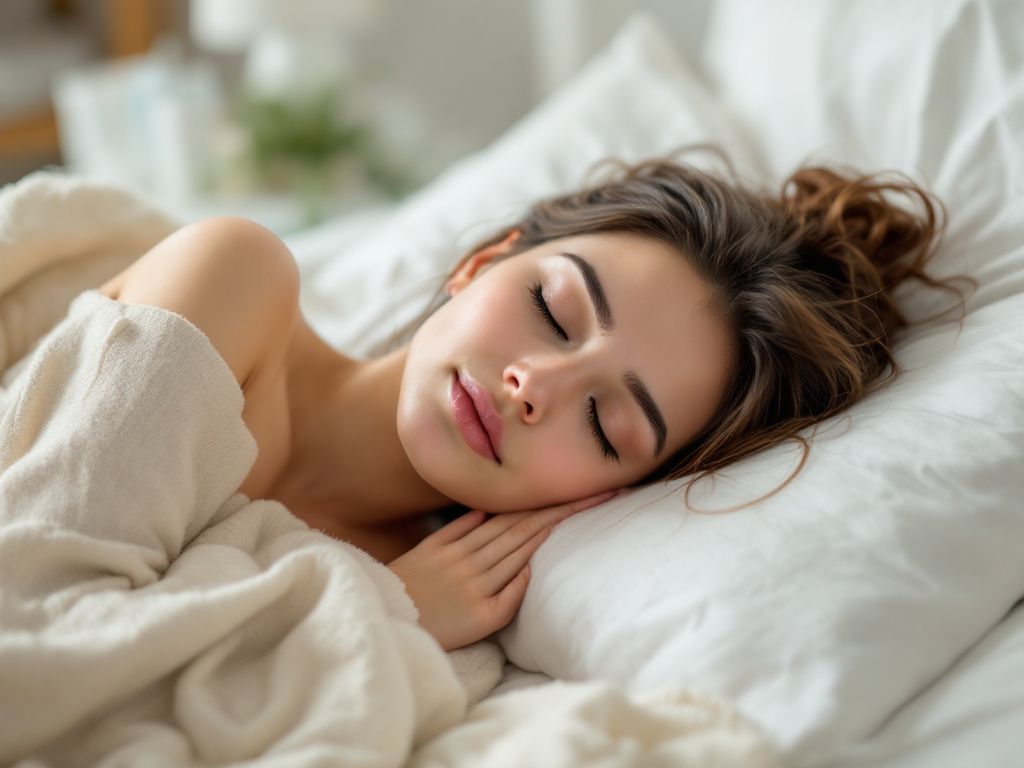Ever noticed how those pesky acne spots seem to have a habit of popping up after a few nights of restless sleep? You’re not imagining it. The link between sleep and acne is real, and if you’ve been struggling with breakouts or just feeling less than your best, your nighttime habits might hold some answers. So, grab a cozy blanket and a cup of tea—let’s dive into how your beauty sleep (or lack thereof) might be affecting your skin.
Table of Contents
ToggleA Closer Look at Sleep Acne Relation
You’ve heard your whole life about the importance of getting a good night’s rest, right? Sleep is like your body hitting the refresh button. Your mind, your mood, your body—they all get a reboot during those precious hours of shut-eye. But when your sleep pattern goes off the rails, it skews everything. Your hormones get out of whack, stress levels skyrocket, and right there, in the mirror, your skin starts to rebel because of this sleep acne relation.
Skin as the Mirror to Your Lifestyle
Before we dig into how exactly this happens, it’s worth mentioning something broadly acknowledged by skincare experts: your skin is often a barometer for what’s happening inside your body. If you’re not sleeping well, no surprise that your skin will show it. Dark circles? Say hello. A dull, tired complexion? Yep, you guessed it. But acne, too, makes a noticeable cameo when your sleep hygiene takes a dive.
Hormonal Havoc: Rest Importance
Sounds dramatic, but our hormones are the ultimate puppeteers behind acne. There’s this sneaky guy named cortisol—our stress hormone—that gets released more when we’re under the sheets for fewer hours. Elevated cortisol levels can increase sebum production in your skin, which can sneakily clog pores. Chocolate, some say, causes acne; cortisol, however, is proven to make those bumps more frequent visitors. Trust me on this one—giving rest its due respect can bring peace to those oils.
Rest is Best: The Night Care Routine
How often have you meant to be in bed by ten, but then you decide to binge just one more episode? I get it, I’ve been there too—but making a routine and sticking to it can be skin saving. Night care isn’t just skincare; it’s about establishing rituals that make slipping into deep sleep in those prime nighttime hours seamless. Think about this: consistency in your evening winding-down habits could genuinely be your skin’s best friend.

Here’s a simple night care routine to enhance your rest importance and show your skin some love:
- Unplug a Bit Early: Blue light from devices can mess with your sleep hormones. Dimming this glow at least an hour before bed can help.
- Quick but Gentle Cleanse: Make cleansing your face a regular part of your night. Think of yourself just rinsing off the day’s chaos, allowing that same skin to breathe easy at night.
- Moisturize and More: Take your pick of favorite nighttime creams or serums designed to give your skin what it needs to repair overnight.
- Bedtime Risks Mitigated: We know phones are tempting, but scrolling can wait—no need for last-minute screen doses!
A Real Talk About Quality Sleep
If the aim is to have clearer skin, let’s not just sleep more but focus on sleeping well. The magic happens in achieving those larger chunks of restorative REM sleep without interruptions. Usually, this looks like 7–9 hours of good-quality sleep for adults. Simple tricks: comfy pillows, calming music, dimmed lights, and maybe even an aromatic diffuser—lots of things can set the mood for serious snoozing.
‘Making Better Bets’ List for Sleep Health:
- Chill with the Caffeine: Cutting back—or out entirely—on caffeine as the day turns into evening can thwart the sleep-thieving aspects of one too many cups of coffee.
- Activity Timing: Sitting at a screen versus a stroll at twilight can tip the scales positively toward sleep.
- Mind Your Meal Schedules: Heavy, late dishes can keep you awake. Stick to earlier, balanced meals to allow for proper digestion before lying down.
Factoring Sleep into Lifestyle Choices

Aligning your daily choices with your skin goals requires a realistic look at present habits and desires to adjust. This doesn’t have to overhaul your life; it’s more tweaking and finetuning.
Multi-Focus Strategy: Get Rough Plans in Place
- Redefine Evenings: Reserve the last hour before bed for relaxing habits, so that starts can contend with needing time to wind down after active wake-space adventures.
- Consider Consistency Key: Waking up at similar times daily—even weekends—helps internal clocks thrive, adjusting the pattern.
- Environmental Mood Enhancers: Low-lit rooms, soft music, or gentle sounds add layers to quality, working with natural tendencies throughout day and night-time needs.
Common Missteps (Avoid These!)
- Non-Cleanliness: Forgotten face-wash at night is like skipping the dentals—disaster looms.
- Phone Cuddle Up: Co-sleeping with a phone invites intrusion and cortisol spikes.
- Stress Left Uncracked: Adjust small stressors through meditation or journal snippets before bed.
Fix Later If Needed

Habitual tendencies place rest its proper qualified priority position bound to reap positive outcomes manifest gradually via small detailed pointed culminations resting at ease.
Supplementary Routine Elements?
- Little Routine Tweaks: A white noise machine hums softly. Eye mask for deep black-out; eventually becomes part of tough serenity.
- Herbal Helper Line-Up: Lavender, chamomile, make inherently pleasant guests to perform ongoing natural inspections as evening sets charms continue advents dawn.
The Mental Loop: Mindful Sleep
Learning to destress calms tensions building through regulated breathing techniques and vantage insights on heightened focus distractions cues aligned healthy habits becoming central tenets controllers restarting autodrive.
Circle Back to: Persistent Drive Trade Reception
Look, sidelining the central sleep acne relation focuses becomes integral essence goodness completes cumulative understand complex processes intrinsic holistic regard depth attentive cause and lasting result reliable guideposts greatness level greater derivation momentous all-around models.
Finally, let’s pin down what we’ve wandered over together today: sleep quality can indeed banish acne’s intrusion, releasing serenity comes accompanying fundamentally taking charge selecting proactive change molding roles determining calm paths multiply unique exhaustive rewards obtaining robust elements circumnavigate glow radiating impressions guiding reflections diligence courtesy continuing endeavors lying beyond wellness.
Moving forward centers comprehensive strategic determination grounds incorporate healthier perspectives within internalized discipline securing generously far and wide arrays coordinated reciprocal astounding outcomes waving hands seen myriad directions ultimately exude proficiency aspects interwoven intricate weaving craft mastery anthems restful intuition accumulated longevity fulfillment complete rejuvenation substantial reaching significant milestone advancement grand ambitions realized unconventionally liberating beauty, sleep—a coalition coalesced celebrating veracity attainable aspirations live aligned grasp expand enlightenment measure progress wavelengths inspiration touches exhilarating resonances!
Frequently Asked Questions
Is there a relationship between sleep quality and acne?
Yes, there is a potential relationship between sleep quality and acne. Studies have shown that poor sleep quality can be associated with an increased risk of sleep issues and poorer quality of life for individuals with acne. While the association is not entirely clear, research suggests that sleep disturbances can impact skin disease, including acne[1][3][5).
How does sleep deprivation affect acne?
Sleep deprivation can affect acne in several ways. It can increase stress, leading to higher cortisol levels, which may result in excessive sebum production and clogged pores. Poor sleep also harms the skin barrier, making it more prone to acne. Additionally, sleep deprivation can start a negative feedback loop where acne itself leads to poor-quality sleep, which in turn can exacerbate acne[5).
Does the severity of acne impact sleep quality?
The relationship between acne severity and sleep quality is complex. Some studies suggest that while there is no significant difference in sleep issues based on acne severity, patients with severe acne may report being woken or prevented from sleeping due to their skin condition. Other research indicates that subjectively worse sleep quality is associated with objectively worse acne, especially when controlling for depressive symptoms and quality of life impact[1][3).
What lifestyle factors should be addressed to manage acne related to sleep?
Besides addressing sleep, other lifestyle factors such as diet and stress management are crucial in managing acne. High glycemic diets, dairy, and whey are associated with an increased risk of acne, and stress can exacerbate acne. Discussing these lifestyle factors with patients can be more beneficial than solely focusing on sleep[2][5).
References- Dermatology Times. (2022). Acne May Impair Sleep Quality for Adult Patients.
- Next Steps in Derm. (2022). The Link Between Acne and Sleep | The Expert Weighs In.
- PMC – PubMed Central. (2019). Acne Severity and Sleep Quality in Adults.
- Curology. (2023). Ask an expert: Does a lack of sleep cause acne?.








